Review| Green Book – A Real Change of Heart
 Race is at the forefront of American culture today. Despite decades of obvious societal evolution, many Americans still believe the country is in the throes of institutional discrimination or is at least headed in that direction again, which is really quite absurd and sad. Even people my age, who are far too young to have been actual victims of Jim Crow laws, feel this way.
Race is at the forefront of American culture today. Despite decades of obvious societal evolution, many Americans still believe the country is in the throes of institutional discrimination or is at least headed in that direction again, which is really quite absurd and sad. Even people my age, who are far too young to have been actual victims of Jim Crow laws, feel this way.
Hollywood has reacted to this disturbing trend with many racially-based “message” films and television shows over the last few years. Not that I blame them; it’s a good business strategy to tap into the current cultural zeitgeist, no matter what the topic is.
Some of these films have done a very good job of illustrating the evils of the past and how we can work past them (Hidden Figures, Selma). Others are designed to reopen old wounds, prevent the healing of decades-long resentments, and/or signal smug, selfish, and unearned moral superiority (Detroit, Get Out, Dear White People). The former is helpful in the conversation; the latter is not.
The new film Green Book is firmly in the former category. It’s an absolutely wonderful bit of storytelling, one that is definitely on my list of the top 10 films of 2018. The film’s sincerity and good humor leap off the screen and fill one’s heart with hope, giving some much-needed perspective about just how far we’ve come as a society in the last 50 years as well as a sobering dose of positivity for the future.
This story, about a refined black piano virtuoso and the friendship he forged with his uncouth white driver in 1962, captured what is truly necessary to change a person’s heart and mind away from terrible thinking – and it isn’t through violence or the passage of draconian laws. It is truly the way of Christ.
SPOILERS AHEAD
The Good: Performances and Humor
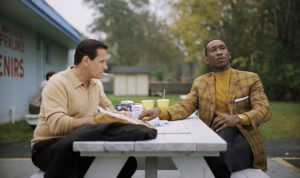
Green Book was anchored by the superb performances of Viggo Mortensen and Mahershala Ali. It was amazing to see these two actors play off each other, like Oscar and Felix from The Odd Couple. Mortensen, as the tough-guy Tony “Tony Lip” Vallelonga, oozes charisma and likeability around his very rough edges. Ali, as piano prodigy Don Shirley, is the exact opposite – cool, dignified, and composed, commanding respect almost instantly. Their chemistry was infectious and one could not take their eyes off the screen when they verbally sparred.
What made these characters particularly endearing was they both were very flawed and in need of some kind of redemption as the story begins. Unlike most modern films that deal with race and the racism of the past, Green Book didn’t pander. There were no one-dimensional great white bigots or overly-virtuous minorities. This story is about the meeting of two equally-flawed individuals, how they both learned to question their own presuppositions, and then walked away friends – changed for the better.
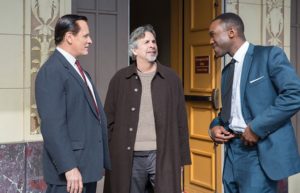 The humor in this film is one of its greatest strengths, and I heap the credit for that squarely on the co-writer/director, Peter Farrelly. Farrelly came out of his comfort zone for this film, as he’s best known for writing and directing a string of successful blockbuster over-the-top comedies like Dumb and Dumber and There’s Something About Mary with his brother Bobby (the former being one of my favorite films of all time). There are no gross-out jokes in Green Book, but the expert understanding of humor and comedic timing is definitely there. I enjoyed all the jokes and comedic moments.
The humor in this film is one of its greatest strengths, and I heap the credit for that squarely on the co-writer/director, Peter Farrelly. Farrelly came out of his comfort zone for this film, as he’s best known for writing and directing a string of successful blockbuster over-the-top comedies like Dumb and Dumber and There’s Something About Mary with his brother Bobby (the former being one of my favorite films of all time). There are no gross-out jokes in Green Book, but the expert understanding of humor and comedic timing is definitely there. I enjoyed all the jokes and comedic moments.
The Bad: Muddled Consequences
The only frustration I had with Green Book came at the end when Tony and Don opted to not play their final gig before Christmas (for the best of reasons). The consequences of such an act had been laid out earlier in the film, but the actual result of the action was never explicitly addressed on screen. It’s a relatively minor annoyance in an otherwise outstanding film.
Truly Changing Hearts and Minds
The title Green Book refers to the pamphlet given to black tourists in the mid-20th century to identify black-friendly hotels and businesses in the Jim Crow South. This prevented blacks from encountering hostile whites and suffering “problems,” as Tony Lip called them. The purpose of Don Shirley’s tour in 1962 was to challenge that segregated society subtly and show that excellence commands respect and isn’t based on skin color.
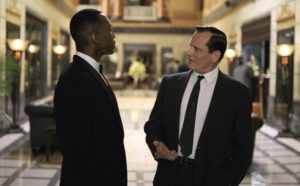
At the midpoint of the film, Tony wondered out loud why Don had voluntarily chosen to play concerts in areas of the country that had actual institutional racism – performing for, smiling at, and shaking hands with those who hate him. Oleg, Shirley’s cello player, responded with a poignant remark: “It takes courage to change people’s hearts.”
How to change hearts and minds is the thematic crux of Green Book, and the script went about it in a brilliant way. The two lead characters personified two completely different ways to get people to change their minds. Tony got compliance through force, threatening people and leveraging violence to “persuade” (a talent of which Tony was very proud at first). Meanwhile, Don believed in a more dignified approach: using his excellence, talent, and dignity as silent but effective weapons against racism.
Over the course of the story, both men learned something from one another as their relationship deepened. Tony repented of his racist views of blacks, had Don refine some of his rougher attributes (including the letter-writing to Tony’s wife), and learned that he could not use violence to solve every problem (though it is sometimes necessary). Don was forced to deal with his feelings of loneliness and, with Tony’s help, learned to let loose a little and refused to play the final show of his tour in protest of his treatment.
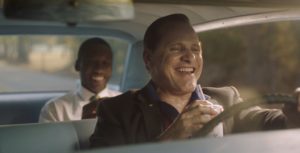 When it came to His ministry on earth and showing people “the Way, the Truth, and the Life,” Jesus changed many hearts and minds by speaking to people on a personal level. Some of His most famous moments of conversion were done intimately: Mary and Martha; the woman at the well; the prostitute about to be stoned; even His disciples – they all met Jesus on a personal level. He approached them humbly and with respect, not through force or using His overwhelming might as God incarnate.
When it came to His ministry on earth and showing people “the Way, the Truth, and the Life,” Jesus changed many hearts and minds by speaking to people on a personal level. Some of His most famous moments of conversion were done intimately: Mary and Martha; the woman at the well; the prostitute about to be stoned; even His disciples – they all met Jesus on a personal level. He approached them humbly and with respect, not through force or using His overwhelming might as God incarnate.
Over 2,000 years after His time on earth, Jesus still works in people’s hearts individually through the Holy Spirit. A Christian’s relationship with Jesus is one-on-one, with Christ working on our hearts to repent of our sinful past and come into His light. Jesus also sends His followers out to proclaim His gospel, planting seeds in the hearts of non-believers to come to Christ. I have found that the most effective way to reach people for God is with the intimate relationships Christians form with individuals.
“You have heard that it was said, ‘Love your neighbor and hate your enemy.’ But I tell you, love your enemies and pray for those who persecute you…” Matthew 5:43 & 44
There are those in society today, exemplified by the evil actions of groups like Antifa, that seek to change minds through violence and intimidation, just as Tony Lip did at the beginning of Green Book (and, ironically, just as the Klan did at the height of their power). Well-intentioned, but still misguided, people seek to change minds through legislation and use the coercive power of the state to force certain changes in people’s thinking.
But as Don Shirley illustrated, changing hearts by force of law or violence doesn’t work and has never worked – at least not in the way it was intended. It doesn’t take courage to point a gun at someone, be it an actual one or a legislative one, and force them to think like you. True courage comes from meeting your enemy on equal footing and, with dignity and respect, discussing differences.
We could all use a little more conversation and understanding in societal discourse. The Creator of the universe seeks to know us each individually and change our hearts with a personal encounter and relationship. Jesus knew that when it comes to the most important thing in a person’s life (personal salvation from sin), a one-on-one conversation goes a long way. So don’t the same rules apply to change the hearts of those fueled by racism?
The Last Word
Green Book is a film that masterfully approaches the subject of race and presents it in a way that actually fosters new understanding instead of ginning up old resentments. Using a good amount of genuine humor and a couple of stunning performances, the film looks at race from a truly unique perspective: simply telling a true story. No pretense, no pandering, no guilt.
What the two protagonists learn in their journey across the Jim Crow South is that changing people’s minds is difficult, but not impossible. Only through genuine understanding, mutual respect, and personal integrity can we truly change hearts and deep-seated prejudices – on ALL sides. Jesus approached people as individual children of God and fostered relationships. It’s not a big stretch that we should do the same.
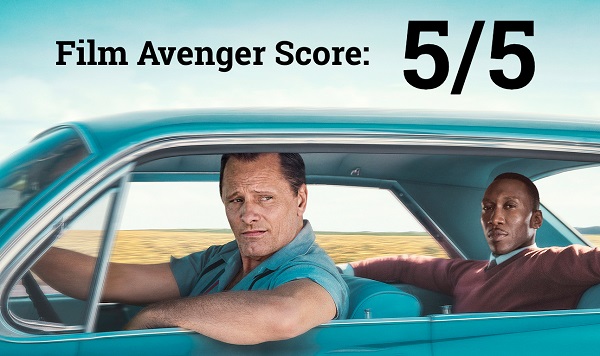


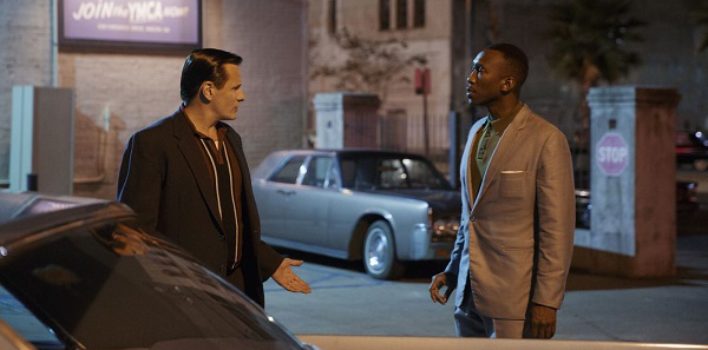
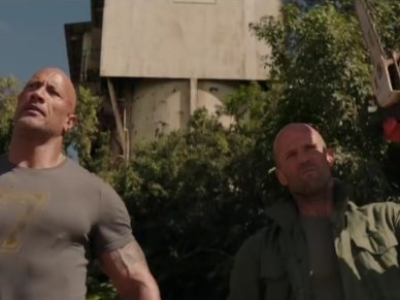

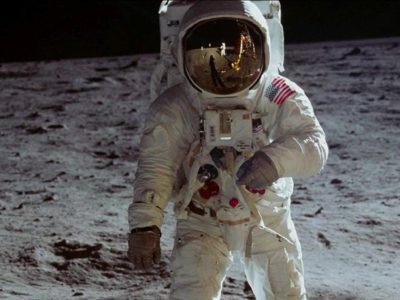


Pingback: My Top Ten 2018: The Film Avenger | Reel World Theology
Pingback: #196 – Green Book and the Value of a Multi-Cultural Perspective | Reel World Theology